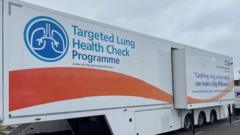Lung cancer survival rate improves: Research

The survival rate among those with lung cancer has improved by more than a quarter in the last five years, according to a new report.
The findings from the American Lung Association's latest "State of Lung Cancer" report shows a 26 percent increase in the survival rate. The improvement, per the organization, is partially due to screening measures that can detect the fatal illness much earlier.
Four years ago, the United States Preventive Services Task Force expanded the screening age range while increasing outreach and awareness of the disease to current and former smokers. The move increased the number of women and Black Americans who were considered at high risk for the disease.
However, in 2022, only 16 percent of those eligible were screened.
“More people with lung cancer are living longer, and that is something to celebrate. However, lung cancer is still the leading cause of cancer deaths in the U.S.," Harold Wimmer, president and CEO of the American Lung Association said.
"This year's 'State of Lung Cancer' report provides a path for states and the federal government to take to improve the lives of people living with this devastating disease," he continued. "Increasing lung cancer screening rates and expanding biomarker testing are enormous opportunities to catch cancer earlier and provide the best treatments for people diagnosed with the disease."
According to the organization, lung cancer has one of the lowest five-year survival rates because cases are often diagnosed at later stages, when the disease is less likely to be treated.
Early diagnosis severely impacts the survival rate. Roughly 43 percent of cases are not caught until a late stage when the survival rate is only 9 percent. More than 20 percent of cases go untreated due to lack of provider or patient knowledge, stigma associated with lung cancer, fatalism after diagnosis, or cost of treatment, according to the report.
People of color are the most threatened by the cancer and are less likely to be diagnosed early, less likely to receive surgical treatment, more likely to receive no treatment and less likely to survive even five years with the disease, the organization said.
The American Lung Association says tobacco use causes 80 percent to 90 percent of all lung cancer cases while secondhand smoke, exposure to pollution and radon — a radioactive gas — also increases the likelihood of contracting the disease.
“There is more work to do, but I am incredibly optimistic about the future of lung cancer care," Wimmer said.
The study did not take into account the impact of the COVID-19 pandemic.
Topics
-
Rising lung cancer rates in Asian women who don't smoke worry experts
Top stories - CBS News - October 28 -
Lung cancer on the rise in nonsmoking Asian women
Top stories - CBS News - October 28 -

Thousands of lung cancer cases detected in lorry clinics
Top stories - BBC News - November 8 -
Rocker Ronnie James Dio remembered with bowling fundraiser for cancer awareness and research
Entertainment - Los Angeles Times - 6 days ago -

Miss America makes push for pancreatic cancer research on Capitol Hill
Politics - The Hill - 4 days ago -
Parts of Great Barrier Reef dying at record rate, alarmed researchers say
Top stories - CBS News - 11 hours ago -

Brother died waiting for lung transplant, says campaigner
Top stories - BBC News - October 31 -

The signs, symptoms and treatment of prostate cancer
Top stories - BBC News - October 21 -

Against Panic: A Survival Kit
Top stories - The New York Times - November 11
More from The Hill
-

Trump watches as Musk's SpaceX launches Starship rocket
Politics - The Hill - 39 minutes ago -

Ukraine Foreign Minister: ‘The United States cannot afford to look weak’
Politics - The Hill - 53 minutes ago -

Evening Report — Democrats kickstart search for new leaders
Politics - The Hill - 59 minutes ago -

Oversight panel presses FEMA administrator on hurricane relief discrimination allegations
Politics - The Hill - 1 hour ago -

Tuberville says Gaetz vote depends on if ‘they can prove’ allegations
Politics - The Hill - 1 hour ago
